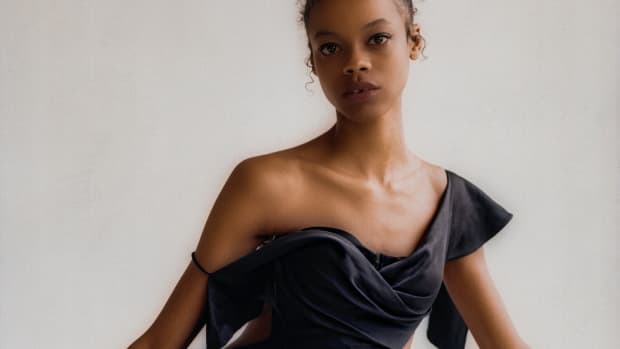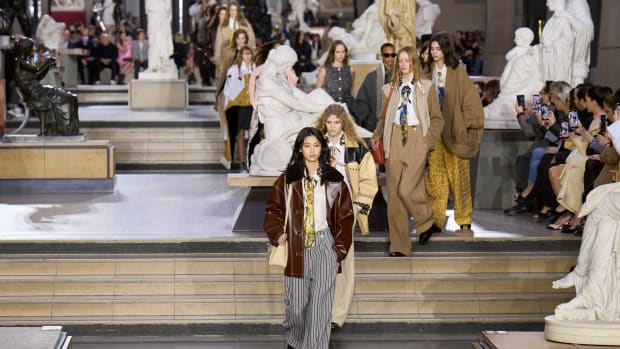Fashion is no stranger to the stylist-turned-designer. Whether it's working with luxury houses to create one-of-a-kind pieces for their clients, collaborating with mass market brands on accessible clothes or launching their
very own label, it's almost more strange these days for a stylist not to try their hand at design.
It would be easy to assume that Paul Burgo, who recently made a name for himself by taking over styling for his friend Anya Taylor-Joy — perhaps you've heard of her? — falls into that category. After all, the red carpet looks he's pulled together for the actor have landed her on best-dressed list after best-dressed list. But actually, it's the other way around: Burgo is the rare designer who dabbles in styling.
"I've known that I've wanted to do this since I was 13 years old. The plan has always been to have my own brand, mostly because I feel the beauty of fashion — to me — is the storytelling capabilities," Burgo says. "You can really convey a narrative through clothing, and I feel it's really hard to tell other people's stories."
Until launching his own label, Factory New York, in November 2021, Burgo's day job was telling other people's stories. At the tender age of 17, he got an internship at Interview magazine; other internships in styling and design followed until he enrolled the illustrious Central Saint Martins. Post-grad, he went to work with Laura Kim and Fernando García at Oscar de la Renta, bouncing to Marc Jacobs for a (very) brief stint under John Targon before rejoining Kim and Garcia at their own label, Monse. It's not a bad CV for someone fresh out of school, but he knew he wanted to do more.
The Covid-19 crisis provided an opportunity for Burgo to take a step back and re-evaluate his career path. "I was just over working around other people's narratives and other people's design methodologies," he says. "I felt like it was time to do my own thing and Covid was kind of, do it or lose it, really."
Still, Factory New York — named after Andy Warhol's famous Factory — didn't start with the intention of launching a fully-fledged brand. Burgo looked around at fabric he'd been "hoarding" for a decade and decided to keep himself busy by designing pieces with it. That grew until he realized he had a collection on his hands, and he had the opportunity to decide what to do with it.
"It didn't feel so daunting because I wasn't barreling head-first into this very conventional idea of what a brand looks like," he says.
Of course, it helps to be well-connected, and once he was ready, Burgo was able to launch with some pretty covetable placements. His first two press-making Factory New York pieces came courtesy of Ivy Getty's now-viral wedding weekend: a silk lamé cape and gown set for maid-of-honor Taylor-Joy and a sequined dress for bride Getty for her rehearsal dinner. The latter garnered him another high profile customer — Alice Longyu Gao, who tapped Burgo for a bridal-esque look of her own — and helped to clarify his brand ethos.
Recommended Articles
"I remember having this conversation with Alice Longyu Gao at Ivy Getty's wedding; she had seen this dress that I had made for Ivy and she was like, 'Oh my God, the beauty, the glamour, that's so appealing to me — I'd love to work together on something like that, that encapsulates glamour,'" he says. "For me, I was so taken aback by that conversation, because it never occurred to me that that was something that people would want out of me, glamour."
It was already something at the top of Burgo's mind — the Instagram bio for Factory New York, after all, reads "New old school." He's always been drawn to glamour, to "prettiness," something that he says isn't exactly "au courant" for the current fashion landscape. He's aiming to change that by modernizing the concept of glamour in a way that makes it feel less exclusionary.
An important component of that goal is designing from a size 00 to a 20, a significantly broader range than most up-and-coming designers start out with. But Burgo isn't doing it for press or for praise.
"I don't feel that I'm out here putting these issues at the forefront of what I'm doing, but I also feel like part of being a designer today — or just being a person with morals — is there are just things that are common decency," he says. "To me, it feels like it should be common decency that there are clothes for everyone. It just feels like that should be the standard, that everyone has sizes available to them."
Because he wants to be able to cater to a broad group of people, custom will continue to be a key component of Burgo's business. It also helps him incorporate the kind of storytelling work he does with his styling, practices he picked up from that very first internship: He can weave in personal details or intimate touches that might otherwise get erased when producing on a broader scale.
"For me, the projects with Ivy and with Alice and with Anya, they were so fun because it was about really trying to capture them in an outfit — I had so many people say of Ivy's dress, 'Oh my God, this is literally Ivy in a dress,'" he says. "It's such a rewarding thing to be told. It felt like that was a mission accomplished. That's definitely something appealing to me, working like that: meeting with people, talking with them about what they like, things that are important to them and trying to turn that into a look for them."
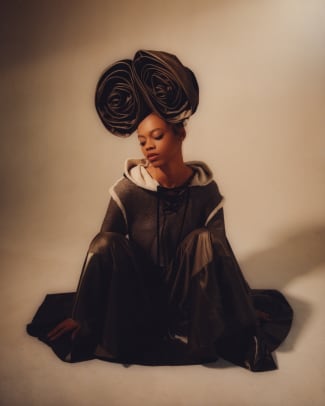
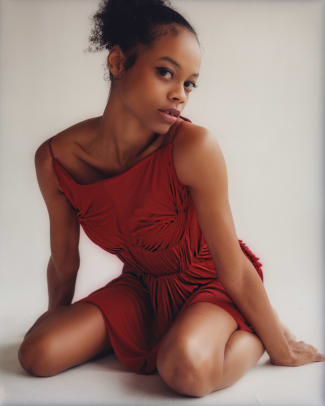
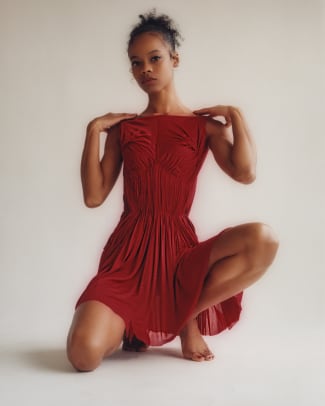
Ultimately, for Burgo, Factory New York is intended for people who want to feel special — famous women like Taylor-Joy and Getty and Julia Fox, yes, but also his friends and people who want fashion to feel, well, glamorous again. It's still early days for the brand (currently, the only item available for purchase on its website is the custom Maîtresse corset), and Burgo knows he'll have to adjust to a rapidly-changing landscape. But he feels confident his slow-and-steady, organic approach to design is exactly what the industry needs right now.
"Talking with friends about their experiences buying clothes, it feels like so many people feel so unconsidered in the industry — that's another big piece to me, is to make it feel it's home to anyone," Burgo says. "And because right now especially I'm focusing a lot on custom work, it feels even more possible for everything to be really considered and catered to the individual, as opposed to [industry] standards."
Want the latest fashion industry news first? Sign up for our daily newsletter.

